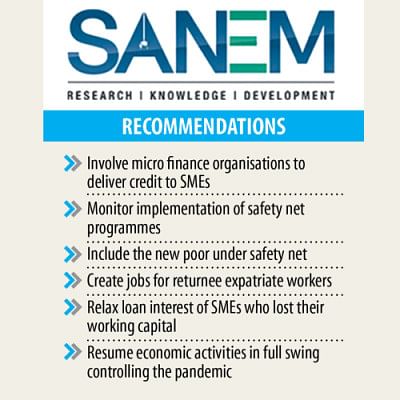Engage micro lenders to disburse stimulus loans among SMEs: Sanem

Microfinance institutions should be involved in fund disbursements from the government's stimulus package to small and medium enterprises (SMEs) so that those firms have quick access to finance amid the ongoing coronavirus pandemic, according to the South Asian Network on Economic Modeling (Sanem).
"Although entrepreneurs are benefitting from the stimulus package, disbursements are being made through the banking system, which is a very slow process," said Sanem Executive Director Selim Raihan.
Raihan made these comments while speaking at a virtual discussion, held yesterday as a part of the Sanem Netizen Forum on Covid-19 Pandemic - Episode 8, styled 'assessing the overall current situation of the pandemic'.
The government previously announced a Tk 20,000 crore stimulus package for SMEs in a bid to provide the sector with enough working capital to survive the coronavirus fallout and continue its growth.
In his argument for why small-scale lenders should be authorised to make disbursements, Raihan said that micro lenders primarily provide financing to SMEs and therefore, involving them would help the sector utilise the stimulus package to its fullest.
The Sanem executive director also expressed appreciation for the government's initiative to protect SMEs as it will help the sector recover alongside the overall economy.
However, he also suggested that authorities should monitor the implementation of the stimulus package to ensure that funds are being properly utilised.
Regarding the social safety net programme, Raihan said that the government is yet to bring people who were recently forced into poverty by the Covid-19 outbreak under the scheme.
Many self-employed individuals became redundant and ended up returning to their villages after failing to secure sufficient working capital due to the ongoing pandemic.
"So, they should be added to the list of eligible people and get full financial cooperation under the stimulus package," Raihan said.
Meanwhile, it is a good initiative to use the foreign exchange reserve to fund development activities. However, the reserve should not be overused as it will discourage foreign direct investment, he added.
While Bangladesh's economic activities will not return to full-swing until the outbreak is brought to heel, East Asian countries like Vietnam are running at full steam after successfully controlling the spread of the deadly pathogen.
Addressing the discussion, Sayema Haque Bidhisha, professor of economics at the University of Dhaka, said that inward remittance rose sharply in recently times as expatriates are transferring all their earnings back home with a view to returning to the country.
"However, their return will also create challenges for the economy as they will almost certainly head back to their villages and remain uninvolved in economic activities," said Bidhisha, also the research director of Sanem.
Besides, the other low-income people left Dhaka to save money on rent while some have even lost their jobs.
"So, this sector should be brought under the social safety net," she added.
Bidhisha also pointed out that SMEs are in not in any position to pay a 4 per cent interest on loans from the stimulus package and so, the government should ease some of the criteria.
Mahtab Uddin, research fellow, and Eshrat Sharmin, research associate, also spoke at the discussion.

 For all latest news, follow The Daily Star's Google News channel.
For all latest news, follow The Daily Star's Google News channel. 



Comments